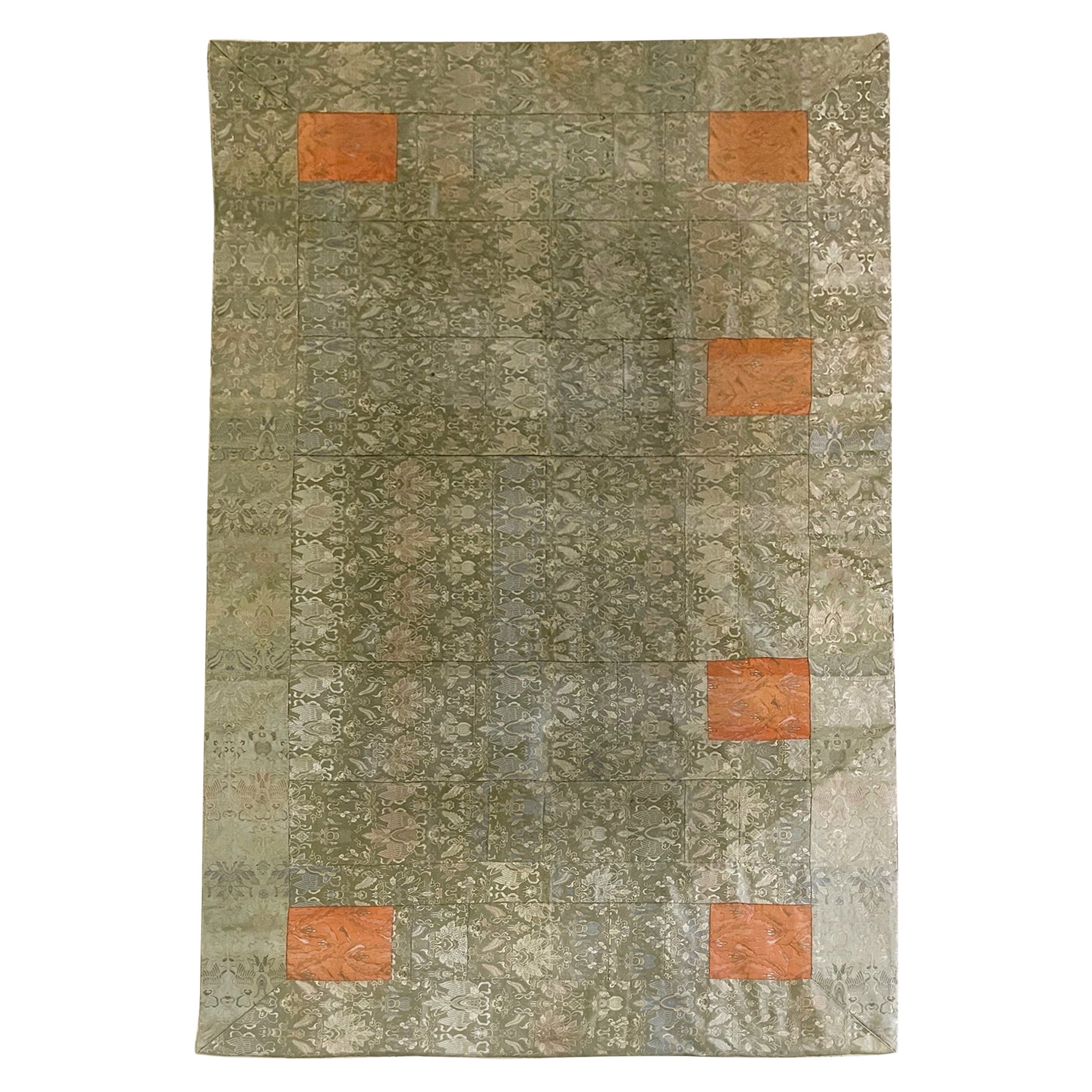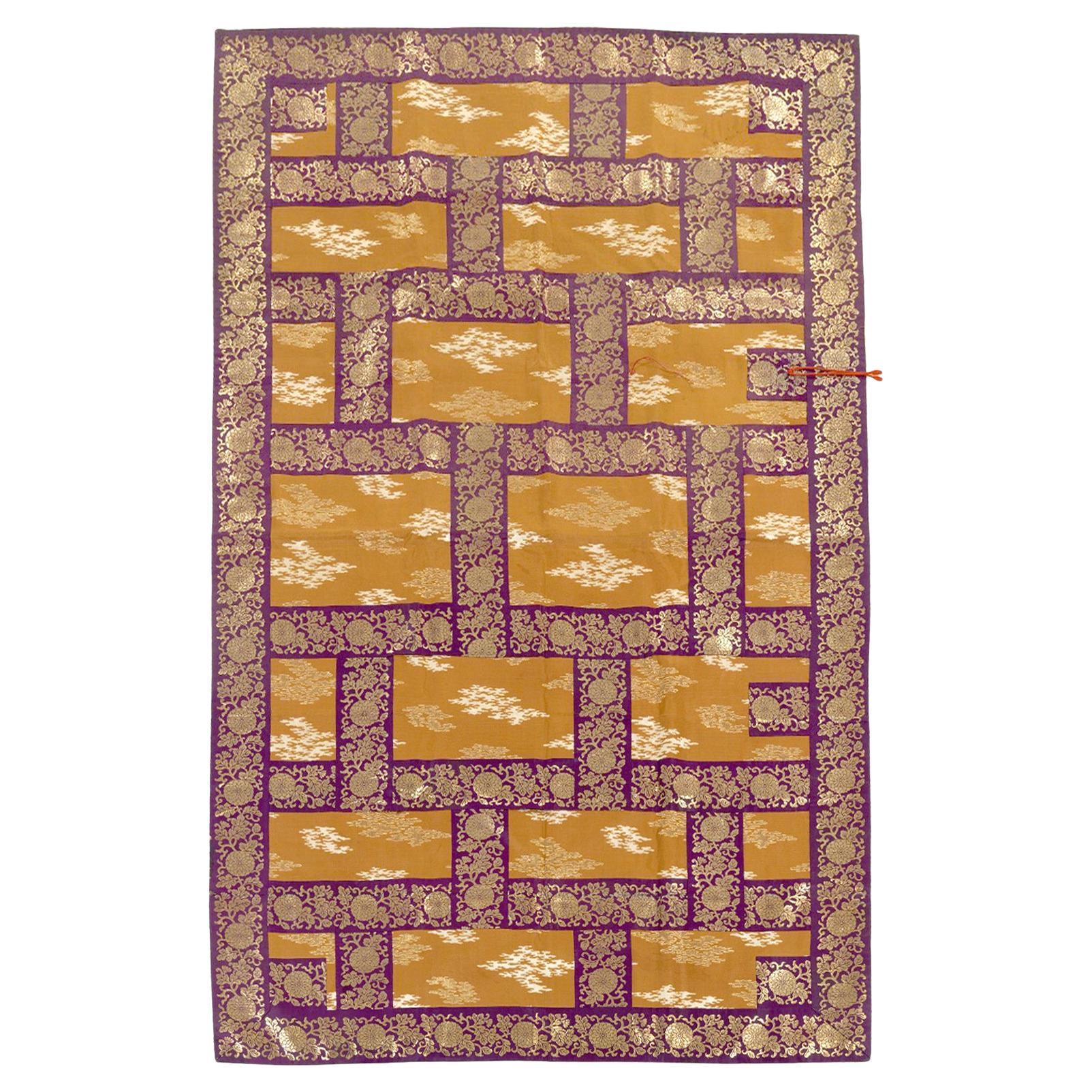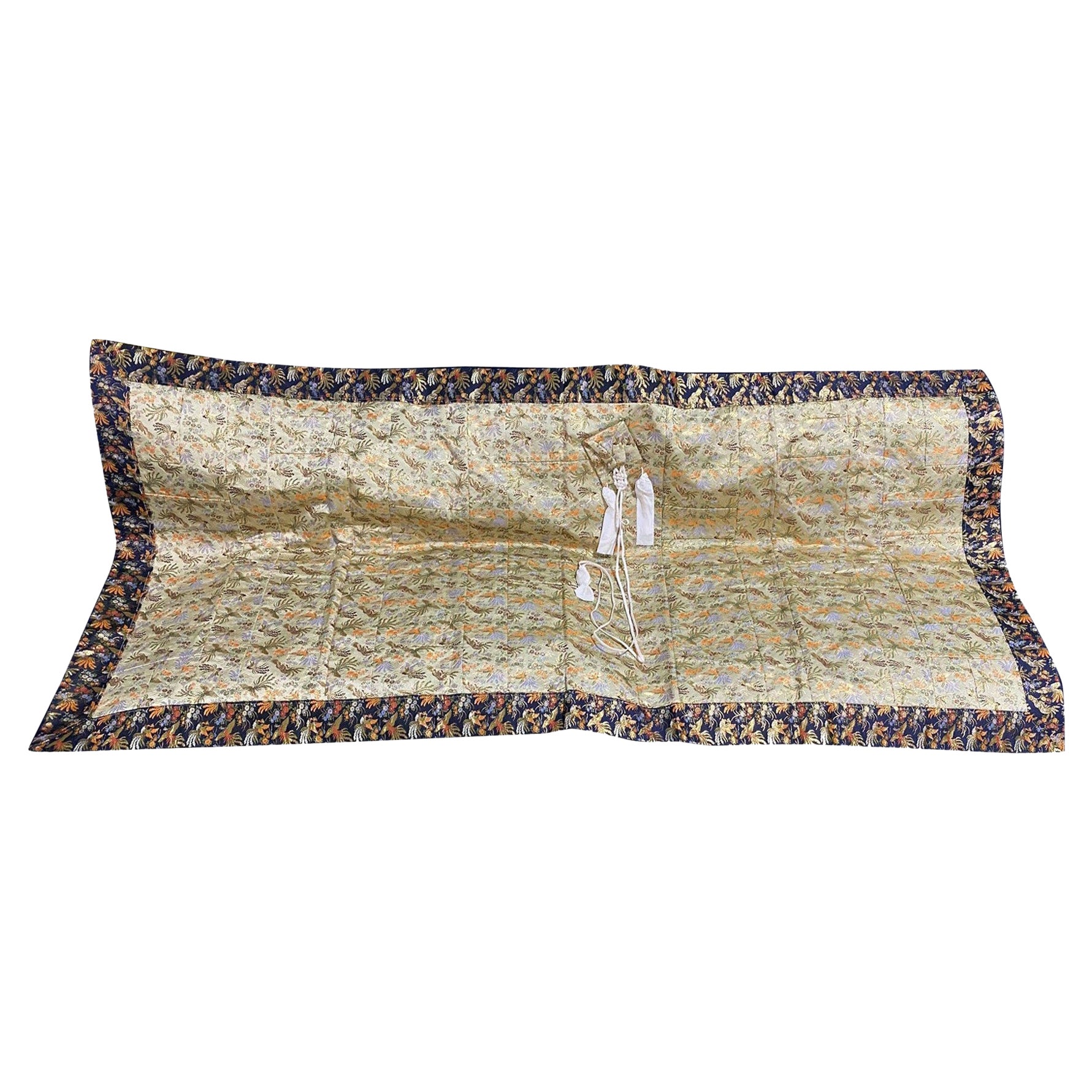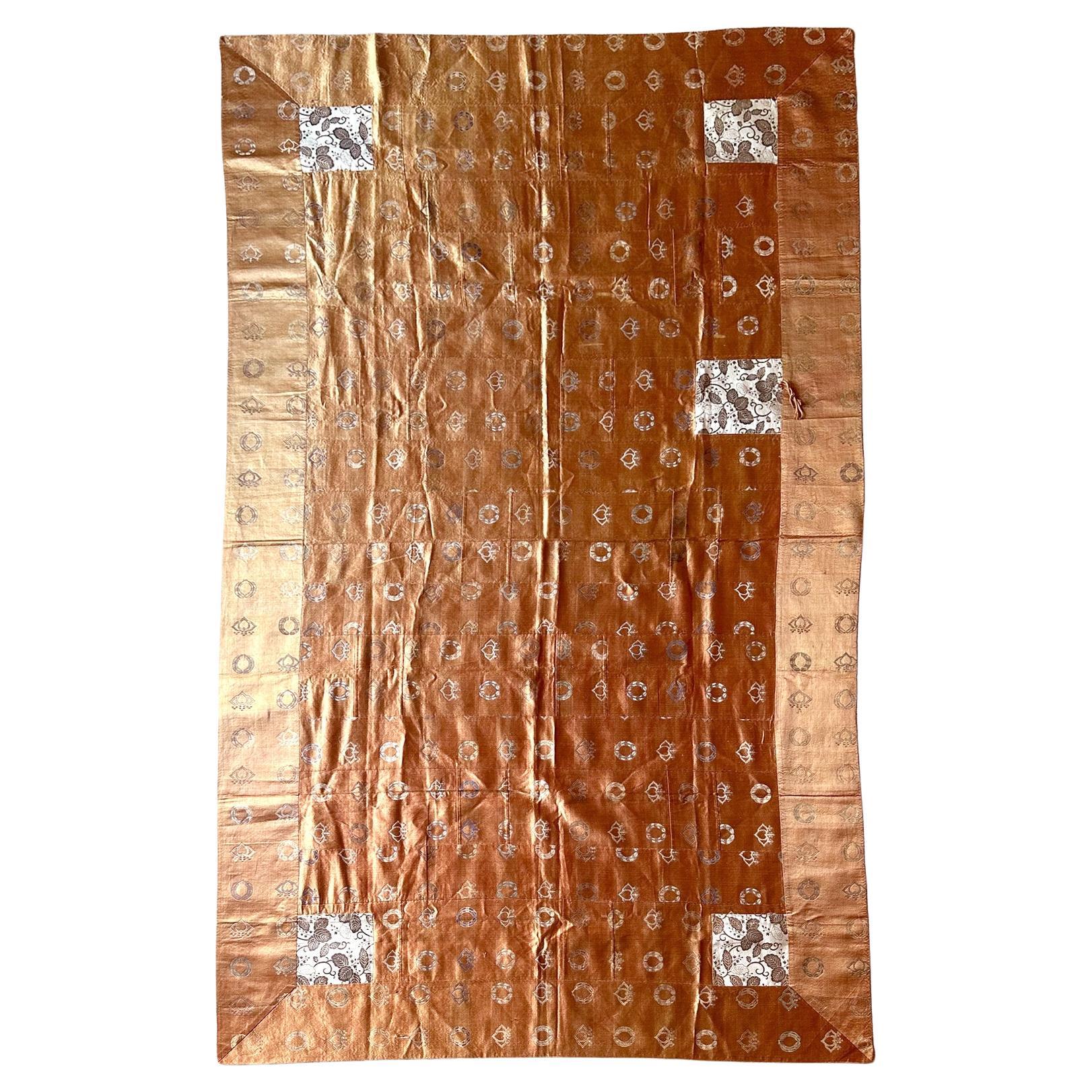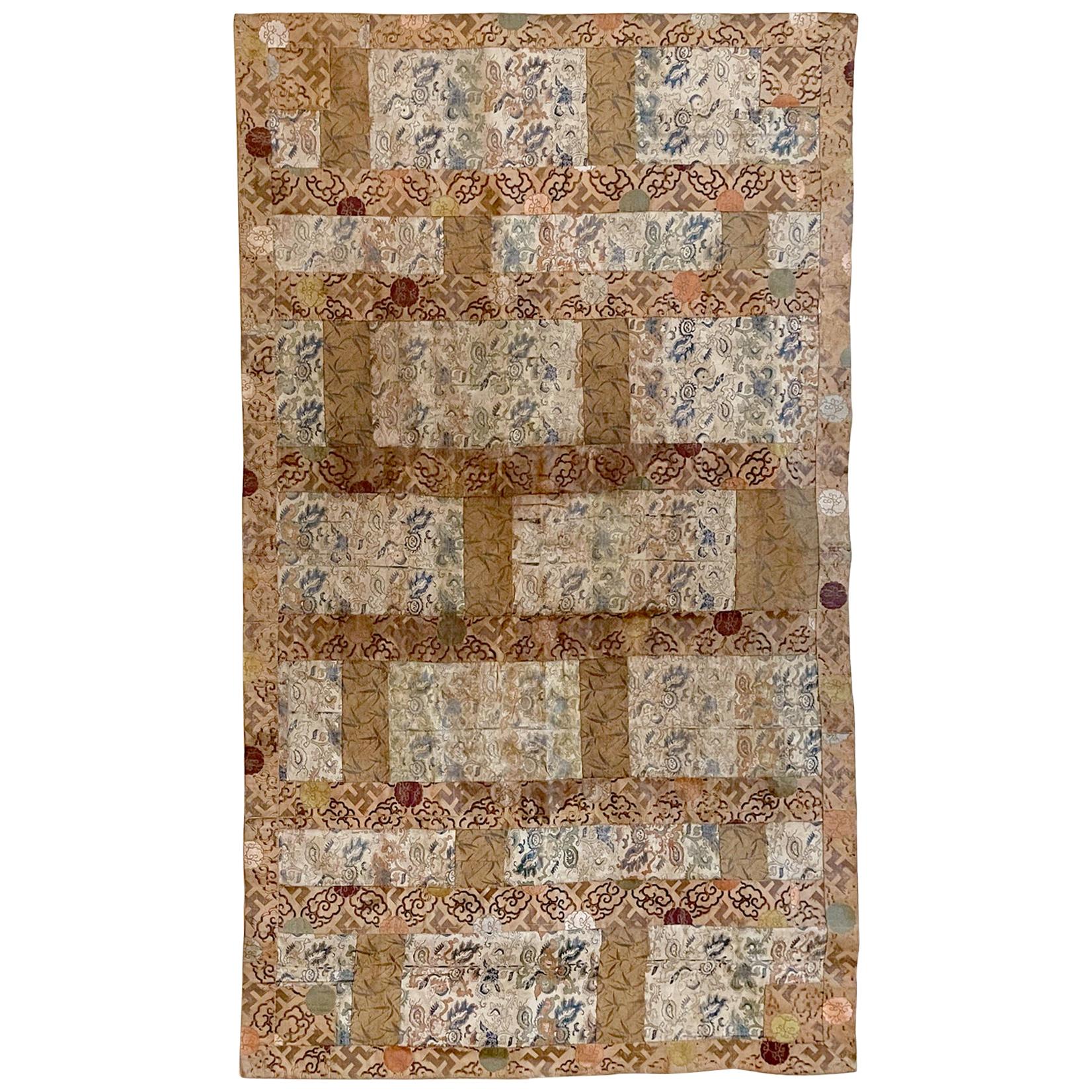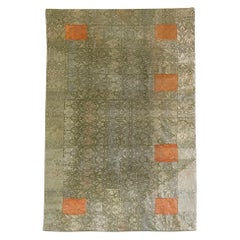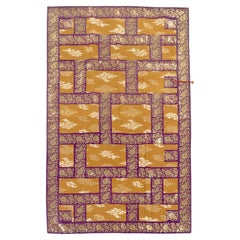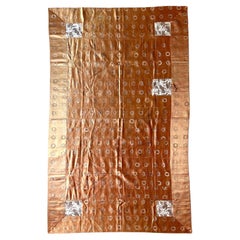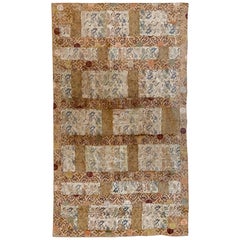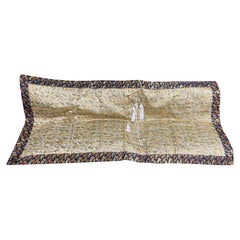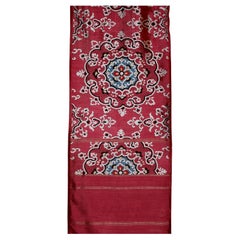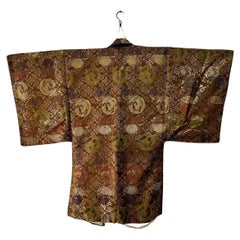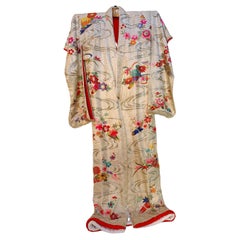Items Similar to Magnificent Antique Japanese Woven Brocade Kesa Monk's Robe Meiji Period
Want more images or videos?
Request additional images or videos from the seller
1 of 21
Magnificent Antique Japanese Woven Brocade Kesa Monk's Robe Meiji Period
$5,800
£4,434.41
€5,107.54
CA$8,127.58
A$9,073.68
CHF 4,754.47
MX$111,070.71
NOK 60,381.82
SEK 56,932.39
DKK 38,118.12
Shipping
Retrieving quote...The 1stDibs Promise:
Authenticity Guarantee,
Money-Back Guarantee,
24-Hour Cancellation
About the Item
A stunning Japanese Kesa (Monk's Vestment) made from thirteen columns of patchworks of shimmering woven brocades with luxuriant golden threads. Dated to late 19th century of Meiji Period, the elaborate woven motifs on this kesa feature repetitive roundels dragon and phoenix intermixed with peonies and chrysanthemum blossoms. Two shades of contrasting gold threads were used on a striking purplish-blue background, with a dark metallic thread for the outer border and a brighter thread for the main body. The brilliantly woven fabric was possibly recycled from Noh costumes, one common tradition in the Meiji period. Six silk squares in contrasting orange color, each woven with a golden phoenix in the center surrounded by a silvery slithering dragon, were sewn to the four corners and the upper longitude side of the Kesa. This completes the symbolism of the robe: the four squares in the corners represent the Four Heavenly Kings (Shi Tenno); while the two slightly larger squares in the middle section represent two compassionate bodhisattvas. Two orange robe ties remain attached to the front. The back of the Kesa was lined with a blue damask silk with a subtle woven pattern. Two loops remained with hand-stitches. The top has a later added stripe of loops that allows the piece to be hung on a pole for display.
The kesa is in remarkably fine condition, other than folding marks and some discoloration on the back. It makes a bespoken textile art.
Kesa is derived from the Sanskrit word kasaya, meaning “dark colored,” a reference to the saffron colored robes worn by early Indian Buddhist monks. It is essentially a rectangular cloth originally sewn from patches of rags, being formless, it serves as a symbolism of the ascetic life of one's choosing. In Japan, since at least the Heian period (794–1185), the kesa has been worn by Buddhist priests as their outermost robe, draped over the left shoulder and attached under the right armpit. While it served some function of protection, it was more a signal of the wearer’s faith, and became increasingly elaborate over the centuries. During the Edo period (1600–1868), many kesa worn were patched together from exquisite silk brocade fabrics that were donated to the temples by members of the aristocracy, ruling military class, or wealthy merchants. By stitching the fabric into a patchwork robe, the monks concentrated their attention on the creation of a devotional work of art, every stitch part of an act of meditation on the teachings of the Buddha. The number of stripes (from 5 to up to 25) indicates the wearer’s rank and the occasion for which it was worn, the highest number of stripes usually only being worn by an abbot during festival ceremonies. The normal daily kesa generally have seven columns. The kesa on offer is more likely a ceremonial robe for special occasion.
- Dimensions:Height: 45 in (114.3 cm)Width: 78 in (198.12 cm)Depth: 0.1 in (2.54 mm)
- Style:Meiji (Of the Period)
- Materials and Techniques:
- Place of Origin:
- Period:
- Date of Manufacture:1880-1900
- Condition:Wear consistent with age and use. Fine antique textile condition. One of the best Kesa we've had, quality and condition wise. Expected only minor wear in keeping with age. Backing with minor fading. Hanging loop on the back was added later.
- Seller Location:Atlanta, GA
- Reference Number:1stDibs: LU945039169122
About the Seller
4.9
Platinum Seller
Premium sellers with a 4.7+ rating and 24-hour response times
Established in 2006
1stDibs seller since 2010
564 sales on 1stDibs
Typical response time: <1 hour
- ShippingRetrieving quote...Shipping from: Atlanta, GA
- Return Policy
Authenticity Guarantee
In the unlikely event there’s an issue with an item’s authenticity, contact us within 1 year for a full refund. DetailsMoney-Back Guarantee
If your item is not as described, is damaged in transit, or does not arrive, contact us within 7 days for a full refund. Details24-Hour Cancellation
You have a 24-hour grace period in which to reconsider your purchase, with no questions asked.Vetted Professional Sellers
Our world-class sellers must adhere to strict standards for service and quality, maintaining the integrity of our listings.Price-Match Guarantee
If you find that a seller listed the same item for a lower price elsewhere, we’ll match it.Trusted Global Delivery
Our best-in-class carrier network provides specialized shipping options worldwide, including custom delivery.More From This Seller
View AllAntique Japanese Brocade Monk's Robe Kesa Meiji Period
Located in Atlanta, GA
A Japanese Kesa (Monk's Vestment) made from thirteen columns of patchworks of shimmering woven brocades. The elaborate motifs feature repetitive elaborat...
Category
Antique Late 19th Century Japanese Meiji Textiles
Materials
Brocade, Silk
Antique Silk Kesa Monk's Patched Robe Meiji Period
Located in Atlanta, GA
Kesa, known as "Jiasha" in Chinese and "Kasaya" in Sanskrit, is an out-layer garment worn by the ordained Buddhist monks. Bearing a basic rectangular form, it developed originally in...
Category
Antique 19th Century Japanese Meiji Textiles
Materials
Textile, Brocade
Antique Japanese Embroidered Silk Kesa Monk's Robe Edo Period
Located in Atlanta, GA
A Japanese Kesa (Monk's Vestment) made from thirteen columns of patchworks of fine shimmering silk fabric of a salmon orange color, the shade of which changed subtly from different a...
Category
Antique 19th Century Japanese Edo Textiles
Materials
Brocade, Silk
Antique Brocade Kesa Monk's Patched Robe Edo Period
Located in Atlanta, GA
Kesa, known as "Jiasha" in Chinese and "Kasaya" in Sanskrit, is an out layer garment worn by the ordained Buddhist monks. Bearing a basic rectangular form, it developed originally in...
Category
Antique Late 18th Century Japanese Edo Textiles
Materials
Textile, Brocade
Japanese Monastery Robe Patchwork Kesa with inscription Edo Period
Located in Atlanta, GA
A Japanese Kesa (Monk's Vestment) made from fourteen columns of patchworks of blue brocades with sumptuous woven pattern. The elaborate motifs feature re...
Category
Antique Early 19th Century Japanese Japonisme Textiles
Materials
Brocade, Silk
Japanese Brocade Noh Costume Kimono Robe Meiji Period
Located in Atlanta, GA
A Noh costume made from magnificent silk twill brocade woven with metallic gold threads circa 1930s. The robe is identified as "Atsuita", made for male actors in the Noh play. The luxuriant fabric has a deep blue background with golden interlocking hexagon pattern that resembles tortoise shells, the symbol of longevity. The motifs showcase three auspicious symbols in repetitive patterns: roundels of coiled dragon, phoenix and peony. The kimono robe...
Category
20th Century Japanese Meiji Textiles
Materials
Brocade, Silk
You May Also Like
Japanese Buddhist Monk Priest 7 Column Silk Brocade Kesa Ceremonial Temple Robe
Located in Studio City, CA
A wonderful, beautifully ornamented and somewhat rare fully intact Japanese Buddhist monk/ priest's Kesa ceremonial silk robe featuring various colorful birds in flight.
Kesa (which came from the Chinese word "kasaya") robes have been handmade/handstitched by monks/priests as an act of devotion as ceremonial robes for centuries in various Asian cultures (Japanese, Chinese, Korean, Vietnamese, Indian, etc.). The kesa is a rectangular garment designed to be worn over the left shoulder (see example image). The robes are made (often in a patchwork column pattern ranging from five, seven, nine or more pannels) specifically for fully ordained Buddhist monks, priests and nuns and are made from donations of exquisite textiles from wealthy patrons of Japanese Buddhist temples. The robes were used in daily ceremonies, temple gatherings, and private meditation.
Antique Kesa robes...
Category
Mid-20th Century Japanese Showa Textiles
Materials
Textile, Brocade, Silk
Signed Silk Brocade Obi
Located in Sharon, CT
Very large (188") hand woven silk brocade Obi.
Category
Antique Late 19th Century Japanese Meiji Textiles
Materials
Silk
$2,500
Rare 19th-Century Brocade Silk Robe for Noh Theatre Performance, Japan
Located in Fukuoka, JP
A rare and historically significant brocade silk robe from 19th-century Japan, originally created for use in Noh theatre, one of the country’s oldest and most revered performing arts...
Category
Antique 19th Century Japanese Edo Textiles
Materials
Silk
Rare Spectacular Hand-Embroidered Silk Japanese Kimono
Located in Brea, CA
This highly collectable spectacular rare kimono has detailed hand-embroidery throughout accented . This ceremonial Japanese kimono is hand sewn and hand-quilted throughout.
Category
Early 20th Century Chinese Chinese Export Antiquities
Materials
Silk
Silk Brocade Japanese Kimono Ceremonial Gown
Located in Vienna, AT
Japanese kimono, richly decorated with polychrome embroideries with silk and metallic threading, featuring a motif of flowering prunus to a cream-white ground. Lined with bright red ...
Category
Vintage 1920s Japanese Showa Textiles
Materials
Silk
Red Silk Brocade Wedding Ceremonial Kimono, Japan.
Located in Brussels, BE
Colorful vintage silk brocade wedding ceremonial kimono.
Museum quality, Mid century, Japan
Category
Vintage 1960s Japanese Japonisme Textiles
Materials
Silk
